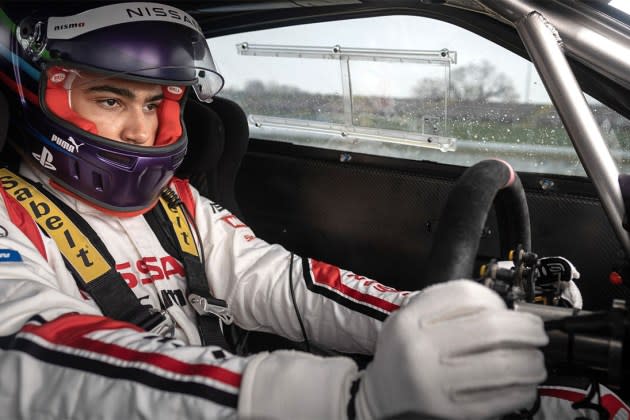‘Gran Turismo’ Review: Orlando Bloom and David Harbour in Neill Blomkamp’s Dynamic Race Car Movie
- Oops!Something went wrong.Please try again later.
- Oops!Something went wrong.Please try again later.
- Oops!Something went wrong.Please try again later.
- Oops!Something went wrong.Please try again later.

While writer-director Neill Blomkamp’s expertise with genre material — from his international breakthrough, sci-fi revelation District 9 (2009), to dystopian dramas Elysium (2013) and Chappie (2015) — makes him a good fit for an action-oriented sports biopic, it’s perhaps his background as a visual effects artist that proves his greatest asset in bringing Gran Turismo to the screen.
Marshaling a well-integrated combination of innovative digital camera techniques, compelling production design choices and an impressive visual style, Blomkamp’s visceral directing emphatically reinforces the film’s dynamic pacing.
More from The Hollywood Reporter
Cannes: Joel Kinnaman to Star in Neill Blomkamp's Alien Abduction Thriller 'They Found Us'
Millie Bobby Brown Says She Is "Definitely Ready to Wrap Up" 'Stranger Things'
Box Office: 'Black Panther 2,' 'Violent Night' Lead Otherwise Icy Weekend
Since it’s “based on a true story” (as the title insistently emphasizes), there’s limited potential for dramatic license with the available material. And while subject Jann Mardenborough has an inspiring backstory, the filmmakers don’t manage to wring much tension from a series of fairly predictable plot developments. But video game enthusiasts, including a sizable audience of Gran Turismo devotees and motorsports fans motivated by Sony’s intensive marketing campaign, are unlikely to quibble much with the film’s limited dramatic arc, making an enthusiastic initial turnout a fair bet.
The loyalty of PlayStation driving simulation game Gran Turismo’s fanbase can be attributed both to the franchise’s long track record since its 1997 launch from Japanese developer Polyphony Digital and to its high degree of consistency with both the real-life vehicles and racing circuits incorporated into the gameplay. This latter characteristic was one of the features that helped Mardenborough develop the driving skills to compete at a professional level, significantly compressing the years of experience typically required to put pro drivers on the winner’s podium.
Initially though, Gran Turismo represents an escapist hobby for teenager Jann (Archie Madekwe), who faces limited employment prospects in the working-class western UK city of Cardiff. Living with his dad Steve (Djimon Hounsou), mom Lesley (Geri Halliwell Horner) and older brother Coby (Daniel Puig) while working as a shop assistant in a local department store, Jann doesn’t think much about the future. Anything that distracts from his hardcore dedication to Gran Turismo doesn’t merit much attention anyway, even if Steve thinks Jann is wasting his time and squandering his potential.
Blomkamp’s script, co-written with Jason Hall and Zach Baylin, doesn’t dwell much on family dynamics or the characters’ psychological motivations, however, preferring to plunge right into the action as Jann enters a Gran Turismo competition co-sponsored by PlayStation and Nissan to recruit gamers and train them as racers to challenge a seasoned field of professionals on the international circuit. As the brainchild of Danny Moore (Orlando Bloom), an American marketing manager for Nissan, the partnership with Sony is envisioned as an elaborate promotional campaign to find video game enthusiasts for the Japanese automaker’s vehicle lineup.
After acing a series of Gran Turismo races, Jann qualifies for Nissan’s GT Academy training school, along with nine other aspiring drivers from around the world, including several women. Only one of them can win the coveted driver position, however, and the film’s predictable arc never leaves much doubt that Jann will come out on top, despite the demanding standards of Jack Salter (David Harbour), a washed-up veteran racer whom Moore recruits to whip the gamers into shape.
It’s not until Jann lands behind the wheel of a racecar on an Austrian circuit that a palpable element of tension and unpredictability surfaces. Learning to drive a supercharged Nissan at speeds approaching 200 mph certainly qualifies as a major achievement, but throwing a newbie in to compete with expert drivers seems like the height of hubris. Moore manages to sell the plan with a combination of irrepressible enthusiasm and cautious strategizing, relying on Salter to support Jann with “you got this” encouragement and grudgingly tough love, which is about as close as the film gets to offering an actual antagonist.
Despite the rather generic scope of his character, Harbour brings a tenacious commitment to his performance and the cast of amateur drivers, which stands in contrast to Bloom’s rather aloof marketing executive, who has only intermittent interaction with the trainees. Madekwe (Midsommar, Apple TV+ series See) capably fills out the key part of Jann, one of the only drivers of color on the racing circuit.
Motorsports fans will appreciate the varied selection of racecars featured in the film, including releases from BMW, Chevrolet, Ford, Ferrari, Lamborghini, McLaren and Porsche, as well as Nissan. In a satisfying twist, Jann Mardenborough, who has gone on to a successful career as a professional racer, serves as stunt driver for his own character, while Madekwe sits in for the close-up simulations in the Nissan’s cockpit.
Blomkamp and cinematographer Jacques Jouffret take expert advantage of Sony’s specialized digital cameras that can operate with remote lenses installed inside the racecars, as well as a variety of high-tech drones for both overhead shots of the race action and POV perspectives of the drivers behind the wheel.
All of these elements help the film overcome a conspicuous deficit of convincing character development and in-depth plotting. In this case, it’s the thrills that sell, and Gran Turismo has plenty of those.
Best of The Hollywood Reporter
Every 'Teenage Mutant Ninja Turtles' Movie Ranked, Including 'Mutant Mayhem'
'Barbie' and Beyond: A Look at Margot Robbie's Career Highlights

